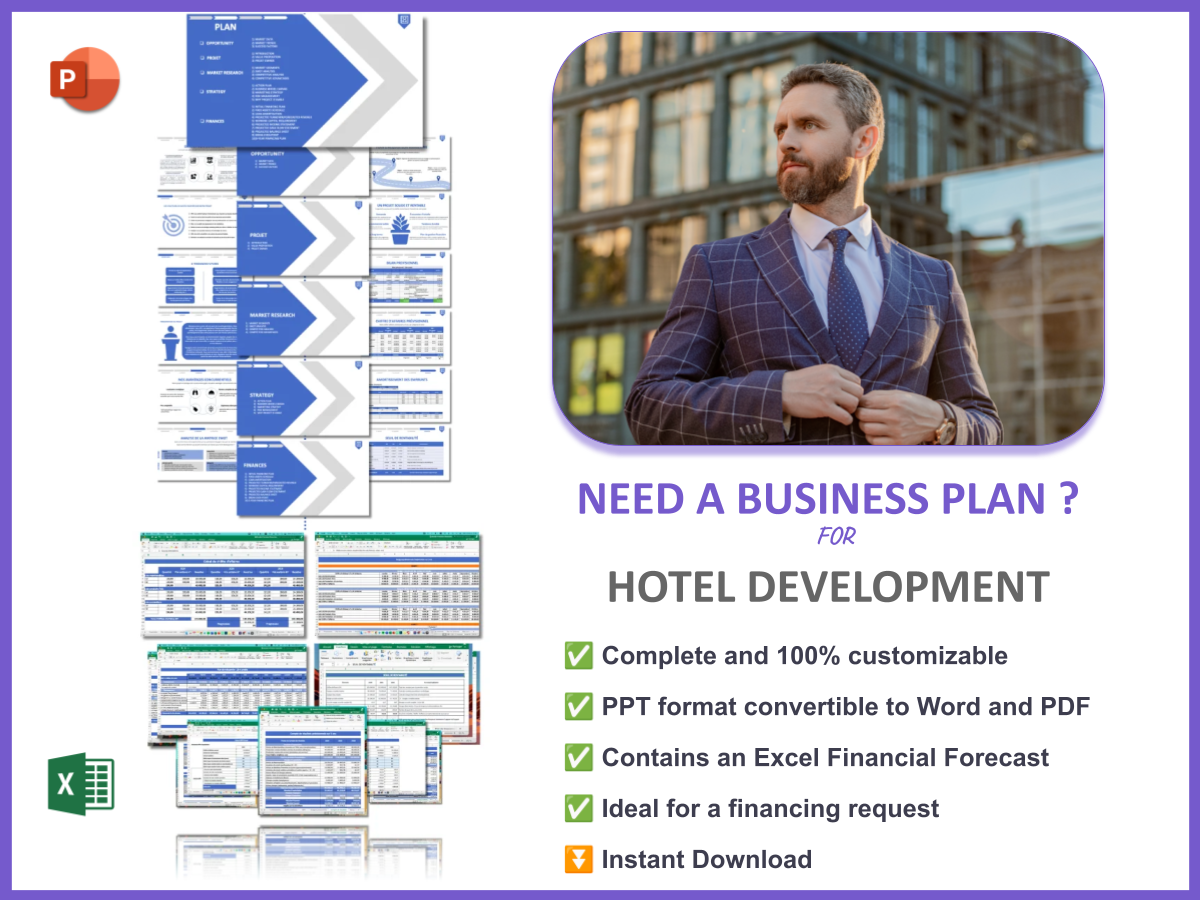Are you thinking about starting a hotel development business? You’re not alone! The hospitality industry is booming, and having a solid Hotel Development Marketing Plan is crucial for success. Did you know that 70% of new hotel projects fail due to inadequate marketing strategies? That’s a staggering statistic that highlights the importance of a well-thought-out plan.
A Hotel Development Marketing Plan is essentially a roadmap that guides you in promoting your hotel project effectively, reaching your target audience, and ultimately driving bookings. In this article, we’ll explore key components to create a successful marketing strategy for your hotel development. Here’s what you can expect to learn:
- Defining your target market
- Understanding your ideal customers
- Analyzing your competitors
- Establishing clear marketing objectives
- Choosing effective marketing strategies
- Evaluating and adjusting your approach
1. Define Your Target Market for the Hotel Development Marketing Plan
| Segment | Characteristics | Examples |
|---|---|---|
| Business Travelers | Frequent travelers, looking for convenience | Corporate events, conferences |
| Leisure Travelers | Families or couples, seeking relaxation | Vacation packages, weekend getaways |
Identifying your target market is the first step in your Hotel Development Marketing Plan. Consider demographics, travel behavior, and preferences. You can segment your audience into groups like business travelers and leisure travelers.
For instance, business travelers often prioritize proximity to business districts and amenities like Wi-Fi and meeting rooms. On the other hand, leisure travelers might look for family-friendly activities and relaxation options. By understanding these segments, you can tailor your marketing efforts effectively.
2. Understand Your Ideal Customers
| Customer Type | Needs | Expectations |
|---|---|---|
| Luxury Guests | High-end amenities | Personalized services |
| Budget Travelers | Affordable options | Value for money |
Understanding your ideal customers helps tailor your marketing efforts. You can conduct surveys or analyze online reviews to gather insights. This information allows you to create targeted marketing campaigns that resonate with your audience.
For example, if your hotel caters to luxury guests, you might emphasize exclusive amenities and personalized services in your marketing materials. Conversely, if you’re targeting budget travelers, highlighting affordability and value-added services can attract more bookings.
In summary, knowing your ideal customers not only shapes your marketing message but also guides your service offerings, ensuring that you meet and exceed their expectations.
3. Analyze Your Competitors
| Competitor | Strengths | Weaknesses |
|---|---|---|
| Competitor A | Established brand, loyal customer base | High prices, limited amenities |
| Competitor B | Affordable rates, good location | Inconsistent service quality |
Conducting a competitive analysis is essential for your Hotel Development Marketing Plan. By understanding who your competitors are, you can identify their strengths and weaknesses, which can inform your marketing strategy.
For example, if you notice that a competitor has high prices but limited amenities, you can position your hotel as a more affordable option with superior services. This competitive edge can help attract customers who are price-sensitive but still value quality.
Additionally, analyzing competitors’ marketing strategies can reveal gaps in the market. If they lack a strong online presence, for instance, you can capitalize on digital marketing to reach potential guests effectively. Remember, knowledge is power, and understanding your competition can give you a significant advantage.
4. Establish Clear Marketing Objectives for the Hotel Development Marketing Plan
| Objective | Measurement | Target |
|---|---|---|
| Increase Brand Awareness | Social media engagement | 20% increase in 6 months |
| Boost Bookings | Monthly reservations | 15% increase in 3 months |
Setting SMART (Specific, Measurable, Achievable, Relevant, Time-bound) objectives is crucial for your Hotel Development Marketing Plan. Clear objectives guide your marketing efforts and provide benchmarks for success.
For instance, if your goal is to increase brand awareness, you might focus on improving your social media engagement by 20% within six months. This could involve creating engaging content, running contests, or collaborating with influencers.
Similarly, if boosting bookings is a priority, you can set a target to increase monthly reservations by 15% within three months. This may involve special promotions or targeted advertising campaigns. Whatever your objectives are, ensure they are clearly defined and regularly reviewed to measure progress and make necessary adjustments.
5. Choose Effective Marketing Strategies for the Hotel Development Marketing Plan
| Strategy | Implementation | Expected Outcome |
|---|---|---|
| Social Media Campaigns | Regular posts, ads | Increased engagement |
| Email Marketing | Targeted newsletters | Higher booking rates |
Choosing the right marketing strategies is crucial for your Hotel Development Marketing Plan. The strategies you implement should align with your target audience and marketing objectives.
One effective approach is to leverage social media campaigns. By regularly posting engaging content and running targeted ads, you can significantly increase your brand’s visibility and engagement with potential guests. Platforms like Instagram and Facebook are particularly effective for showcasing your hotel’s unique features and amenities.
Another powerful strategy is email marketing. Sending targeted newsletters can keep your audience informed about special promotions, events, and updates. This approach not only helps maintain customer interest but can also drive bookings by providing direct calls to action.
Ultimately, the key is to continuously evaluate the effectiveness of your chosen strategies and be willing to adapt as necessary to achieve your marketing goals.
6. Evaluate and Adjust Your Approach
| Metric | Current Performance | Action |
|---|---|---|
| Website Traffic | 1,000 visits/month | Improve SEO |
| Conversion Rate | 2% | Revamp landing pages |
Regular evaluation and adjustment of your marketing approach are essential components of your Hotel Development Marketing Plan. By tracking key metrics, you can gauge the effectiveness of your strategies and make informed decisions.
For example, if your website traffic is only 1,000 visits per month, it might be time to improve your SEO strategies to increase visibility. This can involve optimizing your website content, improving loading speeds, and ensuring mobile-friendliness.
Additionally, if your conversion rate is low at 2%, consider revamping your landing pages to make them more appealing and user-friendly. A/B testing different layouts, content, and calls to action can help identify what resonates best with your audience.
By consistently evaluating your marketing performance and being willing to adjust your tactics, you can enhance your chances of achieving your objectives and driving successful outcomes for your hotel development.
7. Example N°1 of Marketing Plan for a Boutique Hotel
| Steps | Actions | Details |
|---|---|---|
| 1 | Target Market | Millennials and Gen Z |
| 2 | Ideal Customers | Travel enthusiasts, eco-conscious |
| 3 | Competitors | Local boutique hotels |
| 4 | Marketing Objectives | Increase social media following by 30% |
| 5 | Marketing Strategies | Influencer partnerships, sustainable practices |
| 6 | Evaluation | Monthly analytics reviews |
This example outlines a marketing plan for a boutique hotel targeting millennials and Gen Z travelers. The focus is on creating an engaging and eco-friendly environment that resonates with these demographics.
To achieve the goal of increasing social media following by 30%, the hotel can collaborate with influencers who align with their brand values, promoting sustainable practices and unique experiences. Regular reviews of analytics will help track progress and refine strategies as needed.
8. Example N°2 of Marketing Plan for a Luxury Resort
| Steps | Actions | Details |
|---|---|---|
| 1 | Target Market | High-income families |
| 2 | Ideal Customers | Luxury seekers, families |
| 3 | Competitors | Nearby luxury resorts |
| 4 | Marketing Objectives | Boost luxury package sales by 25% |
| 5 | Marketing Strategies | VIP events, referral programs |
| 6 | Evaluation | Quarterly performance reviews |
This example details a marketing plan for a luxury resort that caters to high-income families. The objective is to boost luxury package sales by 25% through targeted marketing efforts.
Implementing strategies such as VIP events and referral programs can create exclusivity and encourage word-of-mouth marketing. Conducting quarterly performance reviews will help assess the effectiveness of these strategies and allow for necessary adjustments to ensure success.
9. Example N°3 of Marketing Plan for a Budget Hotel
| Steps | Actions | Details |
|---|---|---|
| 1 | Target Market | Backpackers, budget travelers |
| 2 | Ideal Customers | Young travelers, students |
| 3 | Competitors | Hostels, budget chains |
| 4 | Marketing Objectives | Increase direct bookings by 15% |
| 5 | Marketing Strategies | Social media ads, partnerships with travel bloggers |
| 6 | Evaluation | Monthly booking analysis |
This example illustrates a marketing plan for a budget hotel aimed at backpackers and budget travelers. The primary goal is to increase direct bookings by 15% through targeted marketing initiatives.
Utilizing social media ads can effectively reach younger audiences who are often looking for affordable travel options. Forming partnerships with travel bloggers can also enhance visibility and credibility, drawing in more bookings through authentic recommendations.
To assess the success of these efforts, conducting a monthly booking analysis will help determine which strategies are working and where adjustments may be needed to optimize results.
10. Example N°4 of Marketing Plan for a Family-Friendly Hotel
| Steps | Actions | Details |
|---|---|---|
| 1 | Target Market | Families with children |
| 2 | Ideal Customers | Parents seeking kid-friendly activities |
| 3 | Competitors | Other family resorts |
| 4 | Marketing Objectives | Increase family package sales by 20% |
| 5 | Marketing Strategies | Family-oriented promotions, contests |
| 6 | Evaluation | Bi-annual surveys and feedback |
This example presents a marketing plan for a family-friendly hotel focusing on families with children. The goal is to increase family package sales by 20% through engaging and appealing marketing strategies.
Implementing family-oriented promotions and hosting contests can attract parents looking for fun and affordable vacation options. Additionally, conducting bi-annual surveys and gathering feedback will provide insights into customer satisfaction and areas for improvement.
By understanding and catering to the needs of families, this hotel can create memorable experiences that encourage repeat visits and positive word-of-mouth recommendations.
11. Example N°5 of Marketing Plan for a Boutique Hotel
| Steps | Actions | Details |
|---|---|---|
| 1 | Target Market | Art lovers, creatives |
| 2 | Ideal Customers | Travelers seeking unique experiences |
| 3 | Competitors | Other boutique hotels |
| 4 | Marketing Objectives | Enhance online presence by 40% |
| 5 | Marketing Strategies | Collaborate with local artists, host events |
| 6 | Evaluation | Social media metrics and event feedback |
This example outlines a marketing plan for a boutique hotel targeting art lovers and creatives. The main goal is to enhance the hotel’s online presence by 40% through innovative marketing strategies.
By collaborating with local artists and hosting art events, the hotel can create a unique atmosphere that attracts travelers seeking extraordinary experiences. Utilizing social media metrics to track engagement and feedback from events will help refine future strategies and ensure ongoing success.
12. Example N°6 of Marketing Plan for an Eco-Friendly Hotel
| Steps | Actions | Details |
|---|---|---|
| 1 | Target Market | Eco-conscious travelers |
| 2 | Ideal Customers | Individuals focused on sustainability |
| 3 | Competitors | Other eco-friendly hotels |
| 4 | Marketing Objectives | Raise awareness by 50% within the community |
| 5 | Marketing Strategies | Green certifications, community events |
| 6 | Evaluation | Community feedback and online reviews |
This example describes a marketing plan for an eco-friendly hotel that caters to eco-conscious travelers. The objective is to raise awareness by 50% within the community through sustainable practices and outreach efforts.
Implementing green certifications and hosting community events can effectively attract individuals focused on sustainability. Gathering community feedback and monitoring online reviews will provide valuable insights into the hotel’s reputation and areas for improvement.
13. Example N°7 of Marketing Plan for a Luxury Hotel
| Steps | Actions | Details |
|---|---|---|
| 1 | Target Market | Affluent travelers |
| 2 | Ideal Customers | Luxury seekers, high-net-worth individuals |
| 3 | Competitors | Other high-end hotels |
| 4 | Marketing Objectives | Increase bookings by 30% during peak season |
| 5 | Marketing Strategies | Exclusive offers, partnerships with luxury brands |
| 6 | Evaluation | Sales metrics and customer feedback |
This example outlines a marketing plan for a luxury hotel focused on affluent travelers. The primary goal is to increase bookings by 30% during peak season through targeted marketing initiatives.
Implementing exclusive offers and forming partnerships with luxury brands can create a sense of prestige and attract high-net-worth individuals. Monitoring sales metrics and gathering customer feedback will help assess the effectiveness of these strategies and ensure they meet the expectations of the target market.
Conclusion
In conclusion, developing a comprehensive Hotel Development Marketing Plan is essential for the success of your hotel project. By defining your target market, understanding your ideal customers, analyzing competitors, and establishing clear marketing objectives, you can create a robust strategy that drives bookings and enhances brand visibility.
If you’re looking for a solid foundation for your hotel project, consider using this business plan template for Hotel Development. Additionally, check out our articles on How to Establish a Hotel Development Business? and How to Create a SWOT Analysis for Hotel Development to further enrich your knowledge and planning process.
FAQ
- What is a Hotel Development Marketing Plan?
A Hotel Development Marketing Plan is a strategic document that outlines how a hotel project will promote itself to attract guests, define target markets, and set marketing objectives. - Why is a Marketing Plan important for hotel development?
A marketing plan is crucial as it helps to identify target customers, analyze competition, and set clear objectives, ultimately leading to increased bookings and revenue. - How do I identify my target market?
Identifying your target market involves researching demographics, travel behaviors, and preferences of potential guests, which can be done through surveys, data analysis, and market research. - What are some effective marketing strategies for hotels?
Effective strategies include social media campaigns, email marketing, partnerships with local businesses, and hosting events to engage with potential guests. - How can I evaluate my marketing efforts?
Regularly tracking key performance indicators (KPIs) such as website traffic, booking rates, and social media engagement can help evaluate the effectiveness of your marketing strategies. - What is the role of social media in hotel marketing?
Social media plays a vital role in hotel marketing by increasing brand awareness, engaging with customers, and driving traffic to the hotel’s website. - How can I improve my hotel’s online presence?
Improving your hotel’s online presence can be achieved through SEO optimization, active social media engagement, and creating valuable content that attracts potential guests. - What are some common mistakes in hotel marketing?
Common mistakes include neglecting online reviews, failing to identify a target market, and not adapting marketing strategies based on performance data. - How important is competitor analysis in hotel marketing?
Competitor analysis is crucial as it helps identify market gaps, understand pricing strategies, and inform your hotel’s unique selling propositions. - What should I include in my hotel marketing objectives?
Your marketing objectives should be specific, measurable, achievable, relevant, and time-bound (SMART), covering aspects like brand awareness, booking increases, and customer engagement.







